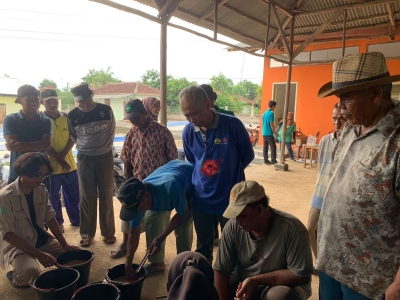Saving Hundreds of Hectares, IPB University’s Bioimmunization Seed Innovation Successfully Overcomes Rice Stem Borer

IPB University's innovative seed bio-immunization technology applied in Subang, West Java has been successful in saving hundreds of hectares of farmers' land. This technology is able to overcome rice stem borers that have become a chronic problem for farmers in Ciasem Baru Village and Ciasem Girang Village, Ciasem District, Subang Regency, West Java.
Technology assistance is carried out by IPB University students guided by Prof Suryo Wiyono and Prof Widodo. Both are experts in plant protection at IPB University. Prof Suryo said there are two principles of stem borer management, namely bio-immunization and collection of egg clusters in the seedlings.
"The collection of egg groups in the seedlings is to reduce the initial population of pests. While bio immunization increases rice resistance to pests and diseases. Both are established IPB University technologies and are ready to be applied massively to areas endemic to stem borers and blast disease," explained Prof Suryo.
Bio immunization is a seed treatment technology with endophytic microbes and plant growth promoting rhizobacteria (PGPR). This technology makes plants resistant to pests and diseases.
Through the Kedai Reka Patriot Pangan IPB University 2022 program entitled Appropriate Technology Application Program to Support National Food Security through One Village One CEO (OVOC). The program involved eight IPB University students and was carried out last December 2022. This activity also involved four farmer groups with 51 people and 200 ha of rice fields.
In mid-March 2023, when the crops were approaching the harvest season, the program showed its success. Almost all farmers participating in the program said that the technology was effective in controlling rice stem borers.
"The seed bio-immunization technology has a good effect on the growth of rice plants, starting from the nursery where the germination rate is almost 100 percent. Seedling growth is also evenly distributed, with roots growing thicker," said Vektor, who is a participating farmer in the program.
In addition, he continued, rice fields treated with bio-immunization seeds are more resistant to rice stem borer pests than rice fields without treatment.
Damis, a farmer who applied the bio-immunization technology, also compared the performance of his rice crop. He suspects that seedbeds treated with bio-immunization seeds are not preferred by stem borer butterflies to lay eggs. In fact, his and another farmer's (Tono) seedbeds are located in close proximity to each other.
"The stem borer attack in my field is much less than in Mr Tono's field. In fact, our fields are only separated by rice field bunds. This was after I applied bio-immunization technology, while Mr Tono's field did not," said Damis, another farmer.
On the other hand, the sundep attack between Damis' and Tono's fields also looks different. In Damis' field, sundep attacks tend to be few and countable. Meanwhile, Tono's land tends to be evenly distributed in each clump. Sundep infestation in plots with bio-immunization seed treatment was much smaller than in conventional fields.
The number of seedlings attacked by sundep in plots without treatment reached 67.30 percent. Meanwhile, the bio-immunization treatment only reached 21.59 percent. Casmudi's bio-immunized rice field, located on the border of the village, was safe from borers, while the field next to it was severely attacked.
"The IPB University program is extraordinary and generally successful. Stem borers in the rice fields of the activity locations proved to be under control compared to others. In the future, technology assistance programs from universities for farmers need to be expanded and intensified. Because now the challenges faced by rice farmers are getting tougher, the climate is getting more uncertain, pests and diseases are getting heavier," said H Mad Anwar, SP, MP, Head of the Technical Implementation Unit (UPTD) of Ciasem District Agriculture. (IAAS/RUM)



